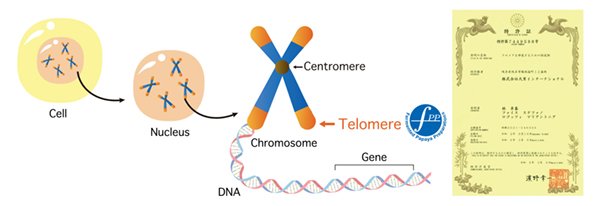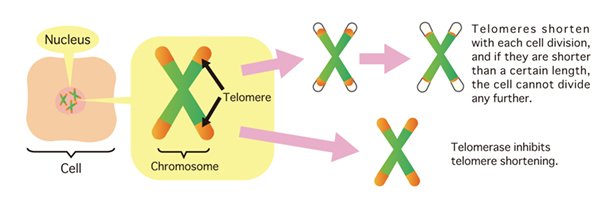News&Topics
Information
2024/04/18InformationResearch Results
Aiming Toward Healthy Aging
FPP has been patented as "Composition for Elongating Telomeres"
in Japan
On March 6, 2024, FPP (Fermented Papaya Preparation) was patented as "Composition for Elongating Telomeres" by the Japanese Patent Office (Patent No. 7449588).

■Telomere Elongation Effect of FPP
The newly granted patent is based on the results of a study conducted by Professor Stefano Faith and his colleagues at the Department of Oncology and Molecular Medicine at the Italian National Institute of Health, on the health benefits of FPP, investigating its effects on redox balance, telomerase and telomere (1).
In this study, mice (C57BL/6J) were divided into two groups; one receiving FPP-supplemented water and one receiving only tap water (control). After 10 months of FPP treatment, telomerase activity, antioxidants (GSH and SOD-1) and Reactive Oxygen Species (ROS) plasmatic levels and the telomeres length in cell from the bone marrow and ovaries were evaluated in both mice groups.
The results showed that early treatment (ET) mice with FPP from 6 weeks to 51 weeks of age (corresponding to humans from 13 to 41 years old) had an impressive increase of telomeres length than control mice in bone marrow cells and ovarian germ cells (+300%, +174%) as well as higher levels of telomerase activity (+58%). Further, late treatment (LT) mice with FPP from 51 weeks to 96 weeks of age (corresponding to humans from 41 to 63 years old) had an increase of telomeres length than control mice in both cells (+101%, +19%) as well as higher levels of telomerase activity (+34%). In both of ET-mice and LT-mice groups, FPP induced an increase in antioxidant levels (GSG and SOD-1), together with a decrease in ROS. These results suggest that FPP modulates cellular senescence by regulating redox balance, activating telomerase, and elongating telomeres.
Click here to access the journal:https://en.ori-japan.com/research/2022/01/18/FPP%20and%20AGING%20antioxidants-09-00144.pdf
■FPP × Control of Melanoma Tumorigenesis
Telomerase is an enzyme that elongates telomeres. It is known to be active in cancer cells, raising concerns about its safety since upregulated telomerase may increase the risk of uncontrolled cell growth and cancer development. Stefano Faith et al. have also proven in mice (B16F10 in C57/BL) that FPP controlled tumor growth, reducing the tumor size in murine melanoma. (2) Thus, it is thought that FPP may contribute to reduce the risk of aging-related diseases associated with cellular senescence, such as cancer, and maintain healthier cells for a longer period.
■FPP × Human Telomeres
In 2022, the joint research of ORI and Italian group reported that FPP showed a significant increase in leukocytes telomerase activity and telomere length in the elderly (107 subjects, 44-74 y/o). In addition, gene expression of TERT and WRAP53, responsible gene for telomere length and stability, showed a significant upregulation by FPP. Moreover, FPP upregulated gene expression of hOGG1, DNA oxidative damage repaor enzyme (3). Based on these results, FPP is expected to play a role in extending the lifespan of human cells and regulating aging process.
Note: Telomeres and Telomerase
The human body is composed of trillions of cells and our life maintained by cycle of cell division and its growth. Telomeres, protecting the ends of chromosomes to maintain their stability, become shorter and shorter at each cell division and new cells are no longer produced, called cellular senescence, when the telomere length reaches below a critical limit. For this reason, telomere is known as "Biological Clock" to determine the lifespan of cells and playing a part in the lifespan of organisms. Importantly, proper maintenance of functions in telomeres and telomerase, the enzyme that replenishes telomeres, leads to an increase in the life span of healthy cells.

■References
1) Logozzi M, Raimo R. D., Fais S., et al: Beneficial Effects of Fermented Papaya Preparation (FPP) Supplementation on Redox Balance and Aging in a Mouse Antioxidants 9, 144(2020);.
2) Logozzi M., Mizzoni D., Fais S., et al: Oral Administration of FPP Controls the Growth of a Murine Melanoma through the In Vivo Induction of a Natural Antioxidant Response. cancers 2019, 11, 118.
3) Marotta F., Zerbinati N., Osato M., et al: Effectiveness of a Fermented Functional Food on Telomere Dynamics and miRNAs in Middle-Aged/Elderly Healthy Individuals: A 2-Year Randomized, Double-Blind, Controlled Clinical Trial. J Biol Regul Homeost Agents. Oct. 2022;36(5):1311-1319.
